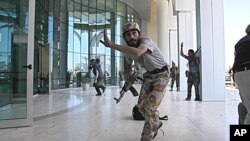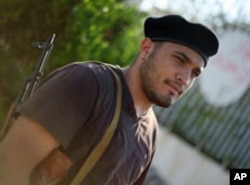The bodies of Libyans killed in the rebel push for Tripoli still lie in the streets outside Moammar Gadhafi's former headquarters compound. But even as the opposition struggles against pockets of government resistance, many Libyans are looking beyond the dramatic events of the past week to what they hope will be a radically new and normal country.
Momentum
Most of the physical infrastructure is still here. NATO airstrikes took out many government positions, but the basics for civilian life, water, electricity, food, if now in short supply, are beginning to come back.
Fitori Abdl Khadr, a resident of the largely rebel-held capital, wants to keep that momentum going. "We need to stop fighting and we need to start building," said Khadr.
Standing near the shores of the Mediterranean, the 23-year-old, gun slung over his shoulder, concedes it is not all over yet. Rebels stomp proudly on torn-down posters of Colonel Gadhafi, even as many of the haphazard checkpoints around the capital stand unmanned. Abdl Khadr thinks there may be a week or so to go. In the meantime, he thinks, opposition forces can split up the work.
"We can make teams to fight and teams to build. We need Libya go back fast as we can," said Khadr.
Loyalties
A former computer technician, he hopes to be part of both. Abdl Khadr left his job with the now-defunct state television to join the opposition cause three months ago. But he says his loyalties lay with the opposition from the start of the uprising back in February.
"When I worked with the government," said Khadr. "I see everything. I know to the revolution, but the government doesn't know."
Abdl Khadr explains his delay in openly siding with the opposition. His father had called for reforms in an online forum and was known to the government. The son says both he and his father were detained after the protests began. He says he got the cautionary message Colonel Gadhafi had sent.
"I fear about my family and my father," he said. "Maybe he kill him. You know, he [Gadhafi] is a crazy man. He kills everyone, no problem."
New Libya
That fear of death helped Colonel Gadhafi run Libya for 42 years, an intensely authoritarian rule built on the idiosyncrasies of one man. Government institutions of the kind most people would recognize did not exist. The same was true of civil society. But Abdl Khadr's hoped-for new Libya has one advantage.
"You know, all fighting in this revolution is not unknowing [uneducated] men. It's skilled men. We have doctors who have guns and [they] fight with us. We have engineers. Everyone in the revolution, I think, he has skills," he said.
For Abdl Khadr, the sooner these professionals can lay down their arms and start building a new society, the better. The young man himself was back at state television this week, making sure the antenna for post-Gadhafi broadcasting was in working order.


























